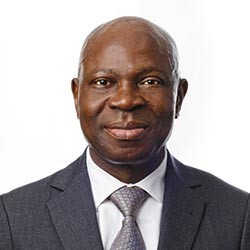Statement by Gilbert F. Houngbo, IFAD President, at COP26 Press Conference: Achieving sustainable & prosperous food systems
IFAD Asset Request Portlet
Publicador de contenidos
Statement by Gilbert F. Houngbo, IFAD President, at COP26 Press Conference: Achieving sustainable & prosperous food systems
with Idris and Sabrina Elba, Conservation International, World Economic Forum, Food Systems Special Envoy Agnes Kalibata and Vanessa Nakate
06 noviembre 2021Not checked against delivery
Today we have a priceless opportunity to advance the fight against climate change and deliver on our sustainable development goal commitments.
But success will depend, in no small part, on investing in the billions of women and men who work on small farms to grow our food.
They are at the frontline of climate change. And they are the custodians of natural resources and biodiversity. But right now, they are not getting the help they need to adapt.
For every 18 dollars spent on climate change mitigation, only one dollar is spent on adaptation. That needs to change.
Small farms are remarkably productive. They grow one-third of our food on only one-tenth of the world’s agricultural land. With the right support they can grow even more and healthier food, and play a key role in feeding growing populations, while at the same time reversing land degradation, deforestation and biodiversity loss.
But in this era of climate change, if we don’t fund small farmers the effects will ripple across the world.
Failure to act comes with high risks – of failed crops, higher poverty and hunger triggering more conflict, forced migration and instability.
But by investing in climate change adaptation now, can we avert these risks and achieve strong and sustainable food systems built on the bedrock of prosperous and productive small-scale farms.
This is why IFAD is scaling up our Adaptation for Smallholder Agriculture Programme – and why we need world leaders to step up funding for it. We must ensure small-scale producers have what they need to build resilient livelihoods and ecosystems, and grow more food for us all.
Investing in agriculture is more effective than any other investment for ending poverty and hunger. And it is critical for safeguarding biodiversity and maintaining healthy and productive ecosystems for future generations.
World leaders at COP have an opportunity to turn the tide.
The time for action is now.
